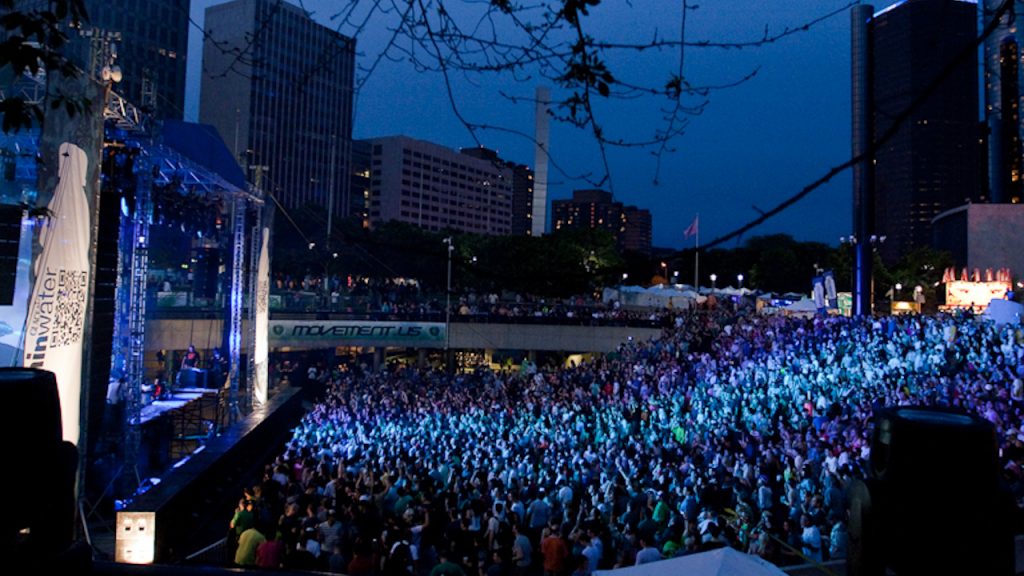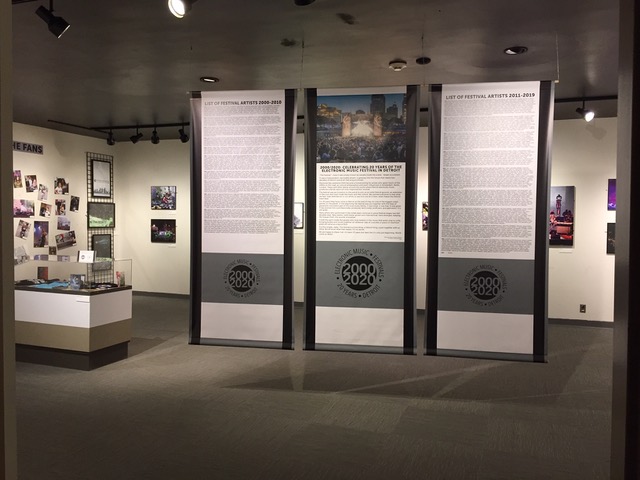The Motor City’s Techno Legacy Arrives at the Detroit Historical Museum
The Movement electronic music festival was one of the many events that were cancelled in 2020, but you can still feel the action at this latest exhibition at the Detroit Historical Museum.

When the Movement electronic music festival launched in 2000 under the Detroit Electronic Music Festival (DEMF) banner, no one knew the impact and legacy that would follow.
Across two decades, the formerly free experimental event has become a local treasure that lures culture aficionados and music lovers from around the globe to hear the sound of Detroit in the city where it was born.
“It’s a lot to do with the sound of the festival — the excitement of being there and bringing that home to Detroit.” — Rita Sayegh, curator
With the 2020 edition of the festival cancelled due to the coronavirus, its spirit is living on with a new exhibit at the Detroit Historical Museum in the city’s cultural corridor near Wayne State University.
Listen: Curators of the new electronic music exhibition at the Detroit Historical Museum talk about the city’s musical legacy.

“2000 / 2020: Celebrating 20 Years of the Electronic Music Festival in Detroit” brings together photographs from a variety of perspectives — the performer’s view, the feeling of being packed into an audience watching the action happen to make patrons feel the energy of the Movement festival itself.
“At the Detroit Historical Museum, we tell all stories,” says Tracy Irwin, chief exhibitions and enrichment officer at the Detroit Historical Society, which operates the museum. “This is a very strong community story. [Part] of this genre kicked off in Detroit. We’re known for it. We travel the world to represent it and people love this festival. We thought this exhibit was a perfect time to do it, so that people could experience a little taste of that, even during these difficult times.”
Irwin produced the exhibition alongside curators Rita Sayegh and Tim Price, who both brought a rich knowledge and personal connection to the festival and the musical genre itself.
Sayegh and Price say that the exhibition covers the performers and music but also a broader culture, audience and fan experience, which is amplified by the curators calling for festival attendees to be part of the living exhibit by submitting their favorite moments.
“It’s a lot to do with the sound of the festival — the excitement of being there and bringing that home to Detroit,” says Sayegh.
The exhibition also serves as part of Detroit Historical Museum’s outdoor lunchtime techno series that features live DJ sets, food trucks and socially-distanced dancing. One of the events is scheduled for Saturday, October 10th and is free and open to the public. DJ Stacey Hotwaxx Hale is scheduled to perform.
A collection of programming that coincides with the exhibition will flow throughout the next year leading up to the 2021 edition of the Movement electronic music festival tentatively scheduled for Memorial Day weekend.
As hesitation lingers to enter spaces in a pandemic, Irwin says the curatorial team at Detroit Historical Museum has taken the necessary measures to ensure a safe and health-conscious visit, adding that “everyone has been graceful in wearing their masks and being respectful of other people’s space.”
“We really talked about if we should do it now or wait until the festival comes back next year, but now is an important time,” says Irwin, “The legacy of music in Detroit and with this festival, it’s really about bringing people together – even if it’s with 100 people throughout the course of the day. This makes you feel alive.”
Trusted, accurate, up-to-date
WDET is here to keep you informed on essential information, news and resources related to COVID-19.
This is a stressful, insecure time for many. So it’s more important than ever for you, our listeners and readers, who are able to donate to keep supporting WDET’s mission. Please make a gift today.
